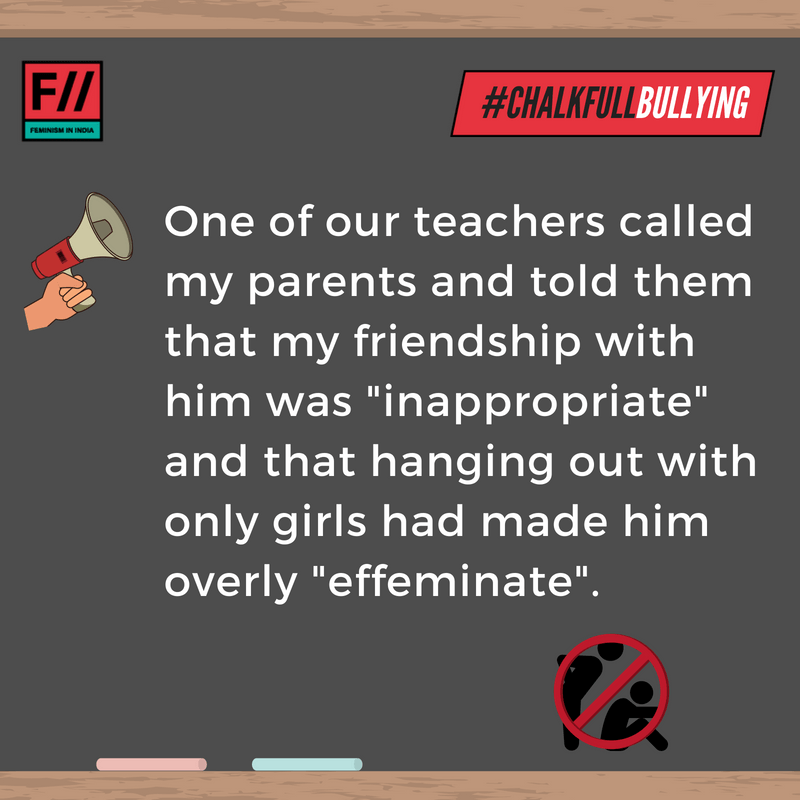Editor’s Note: #ChalkfullBullying is a campaign that resolves to tell stories about gender-based bullying that happens in school, where students, especially non-binary and girl students, are subject to harassment, moral policing, severe disciplining and punishment, and routine bullying. Their fault being: for not conforming to outdated gender stereotypes, the repercussions for which can scar us for a lifetime.
This is the story of how my friendship with my best friend was frowned upon by our classmates, parents and teachers simply because of our gender identities.
My best friend and I met at school when we were in class 11. He was one of those kids who was comfortable having conversations with us girls rather than hanging out with boys. He was also very open to having conversations about any topic, so we used to talk a lot and eventually became friends.
Soon after we became friends, he came out as gay to me. We became very close and used to hang out together during break time. Many of our friends mistook our relationship to be romantic and many people started spreading rumours about it. We never really cared about what our peers thought about us, so we let it go.

Eventually, he made a few male friends and as they gained his trust, he came out to them as well. But they told people about it and people started to take advantage of him. They would pass rude comments about him and occasionally bully him. We didn’t let these issues and comments affect our school spirit or our friendship and chose to ignore them as well.
One of our teachers started to notice our friendship and called my parents and told them that my friendship with him was “inappropriate” and that hanging out with only girls had made him very “effeminate”. Throughout the entire span of our last two years in school, we’ve had teachers, peers and other classmates judge and interfere with our friendship.
Also Read: Why Should Morals Have Anything To Do With Hugs?
My family also thought that the relationship was highly inappropriate and that being close friends with a boy would immediately have a negative impact on the “good girl” image I had in our society. It’s not that my parents aren’t progressive or that they don’t believe in boy-girl friendships, it’s just that both of them live in fear of what society will think and how that would impact my standing with the oh-so-moral and ‘superior’ people in our circle.
This idea is fed into our minds through mainstream media as well. Movies, books and serials always focus on male-female friendships and how they never last because one of them eventually will fall for the other. Girls hang out with girls. Boys hang out with boys. That’s the rule. Any other relationship is not platonic and will always be ruled inappropriate by our society.
Girls hang out with girls. Boys hang out with boys. That’s the rule.
He is a man and men hang out with men and being gay or effeminate is not the right choice. I am a girl and girls with good characters do not spend so much time with boys because a boy and a girl cannot be just friends for that long. It’s unhealthy.
It’s been a year since we finished school and despite being in different cities, we still share the same friendship. My parents do not like our friendship, our peers don’t and neither do our teachers. No one speaks of it. They have come to terms with our friendship and our choices. But almost everyone has a hard time accepting it. We still face passive aggressive comments every now and then.
Sometimes we still have to keep our friendship under the radar. But we refuse to conform to such outdated ideas of gender, sexuality and relationships. We’re still best friends.
Also Read: Why Is Everyone So Afraid of Girl-Boy Friendships?
Featured Image Source: Gender 125
If you (or anyone you know) have a story to tell about the gender-based bullying you encountered in school, please email us at info@feminisminindia.com (or contact us on our Twitter, Facebook and Instagram page) and help us continue a conversation on bullying by those in power in schools. Anonymity is ensured.




